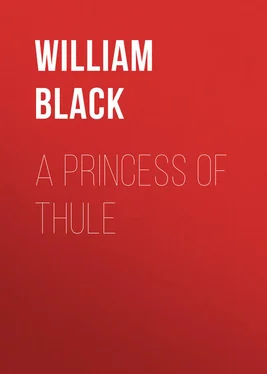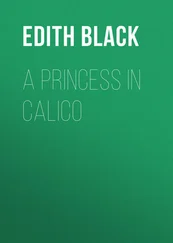William Black - A Princess of Thule
Здесь есть возможность читать онлайн «William Black - A Princess of Thule» — ознакомительный отрывок электронной книги совершенно бесплатно, а после прочтения отрывка купить полную версию. В некоторых случаях можно слушать аудио, скачать через торрент в формате fb2 и присутствует краткое содержание. Жанр: foreign_antique, foreign_prose, на английском языке. Описание произведения, (предисловие) а так же отзывы посетителей доступны на портале библиотеки ЛибКат.
- Название:A Princess of Thule
- Автор:
- Жанр:
- Год:неизвестен
- ISBN:нет данных
- Рейтинг книги:3 / 5. Голосов: 1
-
Избранное:Добавить в избранное
- Отзывы:
-
Ваша оценка:
- 60
- 1
- 2
- 3
- 4
- 5
A Princess of Thule: краткое содержание, описание и аннотация
Предлагаем к чтению аннотацию, описание, краткое содержание или предисловие (зависит от того, что написал сам автор книги «A Princess of Thule»). Если вы не нашли необходимую информацию о книге — напишите в комментариях, мы постараемся отыскать её.
A Princess of Thule — читать онлайн ознакомительный отрывок
Ниже представлен текст книги, разбитый по страницам. Система сохранения места последней прочитанной страницы, позволяет с удобством читать онлайн бесплатно книгу «A Princess of Thule», без необходимости каждый раз заново искать на чём Вы остановились. Поставьте закладку, и сможете в любой момент перейти на страницу, на которой закончили чтение.
Интервал:
Закладка:
“I should be glad if you did that. Every one calls me Sheila,” said the girl quietly enough.
“You would not be vexed?” he said, regarding her with a little surprise.
“No; why should I be vexed?” she answered; and she happened to look up, and he saw what a clear light of sincerity there was shining in her eyes.
“May I then call you Sheila?”
“Yes.”
“But – but – ” he said, with a timidity and embarrassment of which she showed no trace whatever – “but people might think it strange, you know; and yet I should greatly like to call you Sheila; only, not before other people perhaps.”
“But why not?” she said, with her eyebrows just raised a little. “Why should you wish to call me Sheila at one time and not at the other? It is no difference whatever, and every one calls me Sheila.”
Lavender was a little disappointed. He had hoped, when she consented in so friendly a manner to his calling her by any name he chose, that he could have established this little arrangement, which would have had about it something of the nature of a personal confidence. Sheila would evidently have none of that. Was it that she was really so simple and frank in her ways that she did not understand why there should be such a difference, and what it might imply, or was she well aware of everything he had been wishing, and able to assume this air of simplicity and ignorance with a perfect grace? Ingram, he reflected, would have said at once that to suspect Sheila of such duplicity was to insult her; but then Ingram was perhaps himself a trifle too easily imposed on, and he had notions about women, despite all his philosophical reading and such like, that a little more mingling in society might have caused him to alter. Frank Lavender confessed to himself that Sheila was either a miracle of ingenuousness or a thorough mistress of the art of assuming it. On the one hand, he considered it almost impossible for a woman to be so disingenuous; on the other hand, how could this girl have taught herself, in the solitude of a savage island, a species of histrionicism which women in London circles strove for years to acquire, and rarely acquired in any perfection? At all events, he said to himself, while he reserved his opinion on this point, he was not going to call Sheila, Sheila before folks who would know what that meant. Mr. Mackenzie was evidently a most irascible old gentleman. Goodness only knew what sort of law prevailed in these wild parts; and to be seized at midnight by a couple of brawny fishermen, to be carried down to a projecting ledge of rock! Had not Ingram already hinted that Mackenzie would straightway throw into Loch Roag the man who should offer to carry away Sheila from him?
But how could these doubts of Sheila’s sincerity last? He sat opposite her in the wagonette, and the perfect truth of her face, of her frank eyes and of her ready smile met him at every moment, whether he talked to her or to Ingram, or listened to old Mackenzie, who turned from time to time from the driving of the horses to inform the stranger of what he saw around him. It was the most brilliant of mornings. The sun burned on the white road, on the green moorland, on the gray lichened rocks with their crimson patches of heather. As they drove by the curious convolutions of this rugged coast the sea that lay beyond these recurring bays and points was of a windy green, with here and there a streak of white, and the fresh breeze blowing across to them tempered the fierce heat of the sun. How cool, too, were those little fresh-water lakes they passed, the clear blue and white of them stirred into wavelets that moved the reeds and left air-bubbles about the half-submerged stones! Were not those wild geese over there, flapping in the water with their huge wings and taking no notice of the passing strangers? Lavender had never seen this lonely coast in times of gloom, with those little lakes becoming sombre pools, and the outline of the rocks beyond lost in the driving mist of the sea and the rain. It was altogether a bright and beautiful world he had got into, and there was in it but one woman, beautiful beyond his dreams. To doubt her was to doubt all women. When he looked at her he forgot the caution and distrust and sardonic self-complacency his Southern training had given him. He believed, and the world seemed to be filled with a new light.
“That is Loch-na-Muil’ne,” Mackenzie was saying, “and it iss the Loch of the Mill; and over there, that is Loch-a-Bhaile, and that iss the Loch of the Town; but where iss the loch and the town now? It wass many hundreds of years before there will be numbers of people in this place; and you will come to Dun Charlobhaidh, which is a great castle, by and by. And what wass it will drive away the people, and leave the land to the moss, but that there wass no one to look after them? ‘When the natives will leave Islay, farewell to the peace of Scotland.’ That iss a good proverb. And if they have no one to mind them, they will go away altogether. And there is no people more obedient than the people of the Highlands – not anywhere; for you know that we say: ‘Is it the truth, as if you were speaking before kings?’ And now, there is the castle, and there wass many people living here when they could build that.”
It was, in truth, one of those circular forts, the date of which has given rise to endless conjecture and discussion. Perched up on a hill, it overlooked a number of deep and narrow valleys that ran landward, while the other side of the hill sloped down to the sea-shore. It was a striking object, this tumbling mass of dark stones standing high over the green hollows and over the light plain of the sea. Was there not here material for another sketch for Sheila? While Lavender had gone away over the heights and hollows to choose his point of view a rough and ready luncheon had been spread out in the wagonette, and when he returned, perspiring and considerably blown, he found old Mackenzie measuring out equal portions of peat-water and whisky, Duncan flicking the enormous “clegs” from off the horses’ necks, Ingram trying to persuade Sheila to have some sherry out of a flask he carried, and everybody in very good spirits over such an exciting event as a roadside luncheon on a summer forenoon.
The King of Borva had by this time become excellent friends with the young stranger who had ventured into his dominions. When the old gentleman had sufficiently impressed on everybody that he had observed all necessary precautions in studying the character and inquiring into the antecedents of Lavender, he could not help confessing to a sense of lightness and vivacity that the young man seemed to bring with him and shed around him. Nor was this matter of the sketches the only thing that had particularly recommended Lavender to the old man. Mackenzie had a most distinct dislike to Gaelic songs. He could not bear the monotonous melancholy of them. When Sheila, sitting by herself, would sing these strange old ballads of an evening, he would suddenly enter the room, probably find her eyes filled with tears, and then he would in his inmost heart devote the whole of Gaelic minstrelsy and all its authors to the infernal gods. Why should people be forever maddening themselves with the stories of other folks’ misfortunes? It was bad enough for those poor people, but they had borne their sorrows and died, and were at peace. Surely it was better that we should have songs about ourselves – drinking or fighting, if you like – to keep up the spirits, to lighten the serious cares of life, and drown for a while the responsibility of looking after a whole population of poor, half-ignorant, unphilosophical creatures.
“Look now,” he would say, speaking of his own tongue, “look at this teffle of a language! It has no present tense to its verbs; the people they are always looking forward to a melancholy future or looking back to a melancholy past. In the name of Kott, hef we not got ourselves to live? This day we live in is better than any day that wass before or iss to come, bekass it is here we are alive. And I will hef no more of these songs about crying, and crying, and crying!”
Читать дальшеИнтервал:
Закладка:
Похожие книги на «A Princess of Thule»
Представляем Вашему вниманию похожие книги на «A Princess of Thule» списком для выбора. Мы отобрали схожую по названию и смыслу литературу в надежде предоставить читателям больше вариантов отыскать новые, интересные, ещё непрочитанные произведения.
Обсуждение, отзывы о книге «A Princess of Thule» и просто собственные мнения читателей. Оставьте ваши комментарии, напишите, что Вы думаете о произведении, его смысле или главных героях. Укажите что конкретно понравилось, а что нет, и почему Вы так считаете.












